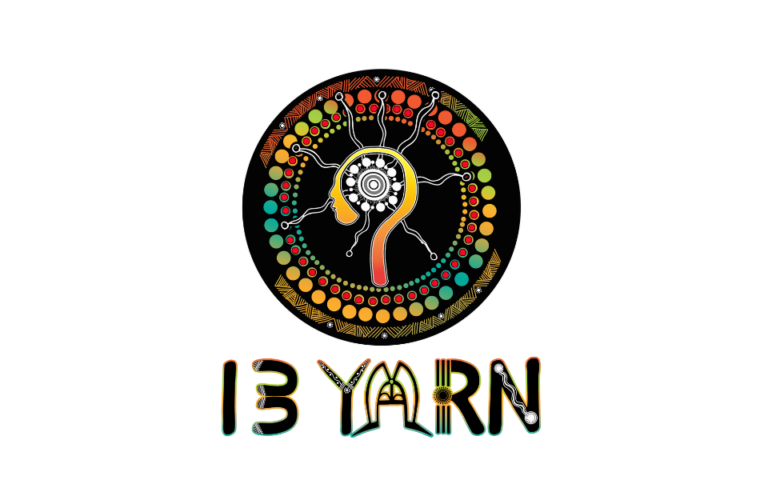This fact sheet has been developed by 13YARN to provide you with information and assistance during challenging times.
Understanding and Managing Grief, Loss, and ‘Sorry Business’
It’s important to acknowledge the deep connections that we share with our family and community are connected to land, culture, ancestors, and lore. These connections mean our experiences of grief, loss, and ‘Sorry Business’ are heavy and strong. The depth of these experiences can at times feel overwhelming, but remember, they also serve as a reminder to our mobs’ resilience, unity, and cultural richness.
Understanding Grief and Loss
Grief is an emotional response to loss, which might include the death of a loved one, loss of health, ending of a relationship, loss of a job, or loss of cultural connection, such as moving off country. Grief can look different for each person, and often has feelings of sadness, anger, guilt, or confusion. It is important to acknowledge and express these feelings without judgement. Remember, it is okay to grieve, and it is okay to talk about seeking help when you are grieving.
Engaging with ‘Sorry Business’
‘Sorry Business’ is a term used by mob to describe the traditional practices surrounding death. It is a time when we come together to express our shared grief, to support one another, and to honour the lives of those who have passed. ‘Sorry Business’ can involve specific cultural rituals, obligations, and responsibilities that might vary across different communities.
During ‘Sorry Business’, you might feel a range of powerful emotions – from sadness and loss to an overwhelming sense of responsibility. It’s crucial to remember that such feelings are natural responses to the death of loved ones and the significant role ‘Sorry Business’ plays in our communities.
Typical Reactions to Grief, Loss, and ‘Sorry Business’
1. Emotional Reactions: Feelings of sadness, anger, confusion, guilt, fear, relief, or numbness. These emotions might be powerful and go up and down, changing from moment to moment.
2. Physical or Body Reactions: Physical symptoms such as tiredness, not being able to sleep, changes in appetite, headaches, stomach aches, and other physical discomforts.
3. Cognitive or Mental Reactions: Difficulty concentrating, preoccupation with the loss, confusion, intrusive thoughts about the deceased or the loss, or dreams about the deceased.
4. Behavioural Reactions: Changes in normal behaviour patterns, such as withdrawing from others, restlessness, crying, neglecting self-care, or over-engaging in activities to avoid feelings.
5. Spiritual Reactions: Deep questioning of one’s spiritual beliefs, seeking answers and comfort in cultural practices, feeling a deeper connection or disconnection with spiritual beliefs, or experiencing signs and messages.
6. Social Reactions: Feeling disconnected from mob, or a heightened need to connect with others, a sense of loneliness, or difficulties engaging in social situations.
7. Cultural Reactions: During ‘Sorry Business’, there might be an increased commitment to cultural duties, a deeper sense of connection to one’s cultural identity, or feelings of stress related to the obligations and responsibilities of ‘Sorry Business’.
It’s important to remember that these reactions are typical and are a part of the natural process of grieving. Everyone’s experience with grief, loss, and ‘Sorry Business’ is unique, and it’s okay to seek help if these reactions are overwhelming or if they persist for an extended period.
Strategies for Coping
Draw on Cultural Strengths: Our culture provides us with strength and guidance. Engage with cultural practices, elders, and community as part of your healing journey.
Express Your Feelings: Yarn about your feelings with trusted friends, family, or community members. You might also find comfort in expressing your emotions through art, music, writing, or other creative outlets.
Care for Your Physical Health: Grief can take a toll on your body. Try to eat regular meals, engage in physical activity, and ensure you get plenty of rest.
Seek Professional Support: If your grief feels too heavy to bear, consider seeking help from a health professional experienced in culturally sensitive care. Counsellors and psychologists can provide valuable tools and strategies for managing grief.
Importance of Community
Community plays a vital role in managing grief, loss, and ‘Sorry Business’. Coming together to share stories, to cry, to laugh, and to remember those we’ve lost is a powerful healing process. Let’s continue to uphold our ancestors’ wisdom by leaning on each other during times of sorrow and by lifting each other towards hope and healing.
Remember, there is no ‘right’ way to grieve, and everyone’s journey through grief and loss is unique. However, no one has to walk this journey alone. As a community, we can navigate these challenging times together, honouring our culture and our traditional practices along the way.
About 13YARN
13YARN is the first national service of its kind for Aboriginal & Torres Strait Islander people in crisis. They offer a confidential one-on-one over the phone yarning opportunity and support with a trained Lifeline Aboriginal & Torres Strait Islander Crisis Supporter for mob who are feeling overwhelmed or having difficulty coping. Call 13 92 76 or visit their website. The service is free and available 24 hours a day, 7 days a week.
If you are feeling overwhelmed or are struggling, call Suicide Call Back Service on 1300 659 467 or click the chat button on the right for online counselling. The service is free, and our counsellors are available 24/7.
If it is an emergency, dial 000.








